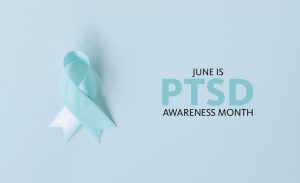 June is PTSD Awareness Month, and Jamaica Hospital Medical Center is doing its part to raise awareness by sharing important facts.
June is PTSD Awareness Month, and Jamaica Hospital Medical Center is doing its part to raise awareness by sharing important facts.
PTSD or Post-traumatic Stress Disorder is a mental health condition that is triggered after experiencing a traumatic event. A traumatic event can be anything from experience in combat, an assault, an accident, or a natural disaster.
While most of us would have a hard time processing a traumatic event, symptoms resulting from that experience are likely to get better over time. Those who suffer from PTSD find that their symptoms do not get better but get worse because there is a significant impact on how they can function in their day-to-day lives.
Some of the symptoms of PTSD include:
- Trouble sleeping
- Reliving the traumatic event
- Nightmares
- Hopelessness about the future
- Loss of concentration
- Difficulty maintaining close relationships.
- Being quick to anger
- Self-destructive behaviors, like abusing drugs or alcohol.
- Hearing or seeing things that aren’t there.
- Being easily frightened
Like most other illnesses, some people have a higher risk factor of suffering from PTSD than others. This includes people who have already gone through a traumatic event, those who do not have a good support structure like close friends and family that they can rely on, and if there is a family history of mental illness or if they already have a mental health problem.
Here are some ways you can help someone with PTSD:
- Learning about PTSD and how it can affect loved ones.
- Listening to the individual when they are uncomfortable with doing certain activities.
- Being there for them, without trying to fix them.
- Encouraging them to seek treatment and participate in activities
- Find support for yourself.
- Recognizing the symptoms, even in yourself. Living with someone with PTSD can sometimes result in secondary PTSD, which is when the partner or family member feels symptoms that are similar to PTSD.
- Combating the stigma. Challenge the stigma that surrounds PTSD and mental health. Be mindful of your language and attitudes. Promote open, judgment-free conversations about mental health in your circles. Encourage others to see PTSD not as a weakness, but as a sign of a person’s resilience.
To schedule an appointment with a mental health professional at Jamaica Hospital Medical Center, please call 718-206-5575.
All content of this newsletter is intended for general information purposes only and is not intended or implied to be a substitute for professional medical advice, diagnosis or treatment. Please consult a medical professional before adopting any of the suggestions on this page. You must never disregard professional medical advice or delay seeking medical treatment based upon any content of this newsletter. PROMPTLY CONSULT YOUR PHYSICIAN OR CALL 911 IF YOU BELIEVE YOU HAVE A MEDICAL EMERGENCY.
